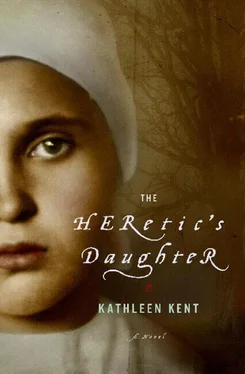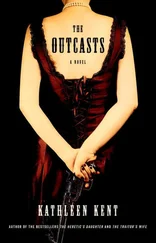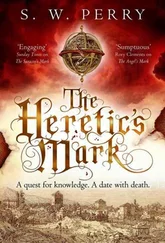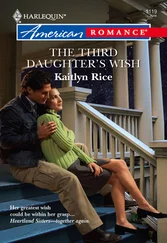Hurrying to the barn I gauged the time to sneak back to the house and take up a biscuit. We had not yet eaten, and my stomach had folded in on itself. I untied Hannah and, giving her over to Andrew, ran to the kitchen and tucked a biscuit into my apron. After a moment’s thought I took yet another, as Mother’s biscuits were hard to break in even parts and if I was clever and quick, I could eat a biscuit in secret while generously encouraging Mother to eat the whole of the other. The cow came willingly enough, as there was no corn left in our garden to eat, and I walked behind, using a stick to keep the calf apace with Mother’s rapid stride. Samuel Preston was our neighbor to the south, below Chandler’s Inn and Thomas Osgood’s house on Preston’s Plain. He was long established in the town, having ten acres, but he was careless with both family and livestock alike. In July Father had found one of Preston’s cows in a bramble pit, her legs and udder torn to bloody ribbons by thorns. He worked her free and spent days salving her wounds with small beer and bear fat. She was returned to Samuel Preston whole but with her injured bag empty of milk. Goodman Preston gave little thanks, accusing us of keeping the cow those few days to take her milk for our own uses.
As we walked I broke small pieces of the biscuit hidden in my apron and put them into my mouth, keeping a close watch on my mother’s determined form marching in front of me. The evening had been cool, laying a fog on the fields, but the sun was raising the billowing mists much as the swelling harbor tide effortlessly lifts an armada of ships. The trees and meadows were still a deep green, but here and there I could see tips of burnt yellow on the outermost branches of the oaks. Elm and ash arched and grew together tangled above the road, blotting out the light like the inverted bowl of a dark green cauldron. Cardinals and crows perched high in their waving green tents, rasping out warning calls. The fragrant air was like a warm, wet flannel on my skin, and I slowed my pace, dragging my shoes in the road to make dust angels. The sound of Mother’s voice, humming a rare tune, rose up warm and throaty, and soon her pace slowed as well. She looked at the crisscrossing bower of branches and at the grasses underfoot and once glanced at me over her shoulder and smiled. Not a smile of unfettered joy, but a smile of pleasure nevertheless. She waited for me in the road and said, “Do you know what day it is, Sarah?”
I thought for a moment and answered, “It’s a Tuesday. I think.”
“It is the first day of autumn. The end of harvest. Ended sooner than expected,” she said, patting the cow’s hide. “What say we have a pudding for supper. There are eggs and a cone of sugar and you shall have licking rights. Would you like that?” Without waiting for an answer, she gave my chin a gentle cupping and then turned from me. It had been a very long time since we had had a pudding, and Mother almost always gave Father or Richard the dregs left inside the bowl. Some hardness within me loosed its grip, and had I been able to see my own face, I am sure I would have seen astonishment and gratitude in equal measures. She walked down the path at an easy pace and motioned with her hand to follow.
I watched from a distance her graceful form moving under the trees into shadow and light and shadow and light. There for an instant and then swallowed up by the darkness, seemingly disappeared from the world. My tongue swam in my mouth as I thought of scraping and licking the pudding bowl, and I decided to give some to Tom for a share of my chores. A jay called out from a lower branch, jittering and fluttering, his tail close enough to touch with my finger. The branch shifted and swayed with a breeze, veiling my face from the sun, and a feeling of dread touched the crown of my head. It poured itself down my brow, my neck, and shoulders, into my chest. My heart beat out fearful humors, enough to lift a tonnage of grain or scale a stone wall, and yet I could not move or call out.
The day had been so very lovely, the summering shades of plant and rock and sky showing the goodness, the reasonability of order, from the Master’s hand. And yet with a shifting of sunlight, I had seen, as though looking into a killing pond, that beyond the restive landscape of the living, the Master stood poised, razor in hand, to cut and scrape away our delicate flesh, leaving only bone and weathered shell. My mother, as strong and hard as any young pine, was suddenly smaller and immensely more fragile. She walked purposefully onward, her forceful nature entwined with her very ribs. But what was that to the awesome power of a God who would at year’s end slaughter off multitudes of the living to begin anew in the spring. And with that thought came the certainty that Mother would soon present herself to Samuel Preston and demand recompense. They would cross words, as the man was mean-spirited and argumentative, and she would give no quarter until she was paid in full, in barter, or in pieces of Goodman Preston’s hide. And as certain as I was of my own name, I knew that he would somehow exact the final payment.
I beat the flanks of the jolting calf so it would move ahead more quickly. Remembering the biscuit in my apron, I thrust it out to her and said, “Mother, here. I brought this for you.”
She looked at me with surprise but took the biscuit. She brought it to her lips but paused and, breaking it into two pieces, handed me half.
“I am not hungry,” I said. “You must stay and eat. Please, can you not sit awhile?”
She shook her head and moved on, saying, “That was kind of you, Sarah, to remember me. But I can eat a biscuit and walk.” She smiled and tossed over her shoulder, “Just as you have done this morning. Now, brush the crumbs from your face or our neighbor will think us unruly.”
Goodman Preston refused to make good the ruined corn, saying that he was no fool and that our crops were already harvested. His wife came to the open door of the house to listen, and I could see that her right eye had been blackened and was swollen, so that the lids were shut together. His children stood about, all white of hair, all dirty and wild-looking. Mother called him “a mean, tightfisted badger who would try to pass a Dutch pound of grain for a hundredweight and who would melt down the lead cover to his well to make a profit even if it meant all five of his children were to fall in.” Having never before encountered my mother’s play with words, he was made speechless for a time.
But he soon recovered and called her “a black-faced waspish harpy in the shape of a woman whose breast must be filled with bile to flail an honest yeoman so and who would just as soon fry up and eat a man’s liver as stay at home and eat maple sugar.”
When he saw he could not drive her away with the sound of his voice, he clenched his fist as though to strike her. Mother then raised over her head the long thorny stick she had used to prod the cow. I don’t think, until that moment, a woman had ever met his anger without a bowed head and a curved back. It so disturbed his expectations that he took a few steps backwards. I reached down to pick up a stone and, judging the distance to his head, stood nearer to Mother. She simply waited until he had paused to breathe and then said sharply, “Samuel Preston, the next cow that wanders onto our land will be ours in recompense. And from the look of things, we won’t have to wait long before you lose another one.” She gazed into the one good eye of his wife, still standing at the door, and said, “Take heed to take better care of what’s yours or what’s yours will sicken and die.”
She turned and walked away, leaving the cow and her calf standing in the yard. I carried the stone the whole of Boston Way Road and would have carried it into the house but for Mother barring the door. She reached out for my fingers and saw the stone clenched within. Placing one hand beneath mine, she bounced it slightly as though measuring the strength of it. Then, with her other hand, she gently closed my fingers back over the glittering weight of the stone.
Читать дальше












